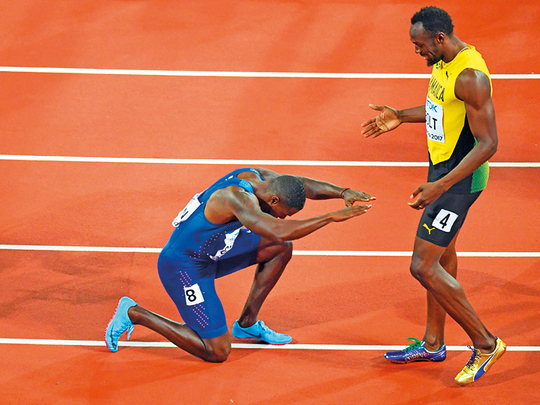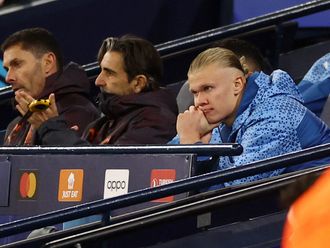
London: The roar was not the same. This time around the cacophony of Super Saturday had a sadder, even an angrier note. Five years on from securing his legend at the 2012 Olympics, Usain Bolt had hoped to bow out of the sport he has for so long electrified, with one last trademark burst of unanswerable speed and joy. In the event, his last act as a solo athlete was to take a bronze medal behind his long-time rival, the American Justin Gatlin.
Few athletes know more about time than Bolt. Having chased it down and exploded it into unlikely tenths and hundredths for more than a decade, it finally caught up with him. His sweatshirt coming into the stadium before this final 100m race of a peerless career bore the motto “forever faster”, but his eyes and his manner told a slightly different story. He went through the motions of his pre-race hype routine, striking the poses, but his heart wasn’t quite in it.
No doubt, in some ways, he had seen this final defeat coming: it was the one attitude — gracious loser — he had never had to display, but he performed it with just as much aplomb as all the others.
Bolt had come to the London World Championships having only once run under 10 seconds this year, and nursing another round of back problems that had necessitated a visit to the German doctor Hans Muller-Wohlfahrt in Munich. Qualifying was shaky in the first round on Friday when he tugged at his beard and complained about the starting blocks being “the worst he had ever seen”.
His semi-final, earlier in the evening, saw him beaten for the first time at that stage in a major championship since his golden run began in 2008. Even so, the feeling around the stadium, and the world, was that he would have enough for one last hurrah.
One of the many things that Bolt has brought to this shortest of all sporting dramas is a sense of unfolding narrative. Because of his size, he has routinely started behind his competitors, and then inexorably reeled them in, running 41 giant strides to their 45 or 46. What used to happen at 50 metres, however, this time didn’t quite happen at 95. For the first time, as he neared the line, the strain showed on his face: he looked like all the others. But the grimace was quickly replaced by a broad grin of gratitude and relief.
Bolt said farewell to Jamaica, where it all started, in June, but it was fitting that he should end the greatest solo athletic career on this particular back straight. London 2012 wasn’t his first Olympic triumph: that came in Beijing. It wasn’t the scene of his most extraordinary feat: that was the “triple double” gold in Rio. But it was the place where his legend was most memorably forged. In that most joyous of Olympics, I was lucky enough to be at the end of the home straight for much of the fortnight; nothing took the breath away quite like Bolt making good on his boasts.
Even then his career was not so much about breaking records as about proving himself the consummate competitor: did anyone really have the nerve, the confidence, the hubris to run past him, the greatest ever? It is eight years since Bolt ran his historic 9.58-second world record in Berlin; he has spent those years losing hundredths of a second, waiting for the rest to catch up. Perhaps inevitably it was Gatlin, 35 years old, the haunted pantomime villain to his prince charming, who emerged to deliver the farewell coup de grace.
Ever since Gatlin, the 2004 Olympic champion, returned to the sport after his second doping ban in 2010, he has played a shadowy Moriarty to Bolt’s effortless Holmes. The more fans have cheered Bolt, running clean, the more they have heckled Gatlin, for having run dirty. This potent morality play had its last twist here.
Gatlin was booed into the stadium and booed across the line.
It fell to Bolt himself to provide some comfort to the world champion, with a hug, and some whispered words of congratulation as the crowd howled its displeasure.
One of the reasons for his global popularity is that Bolt has always understood that sport has never been worth selling your soul for. Having won the world junior games 200m at 15 (apparently so nervous that he had his track shoes on the wrong feet) Bolt had many lucrative offers to join US college track teams. He turned all of them down, and did his training, and his partying, back home.
He has never been shy of calling himself the best — the figures don’t lie — but he has worn that mantle with a degree of humility and a generous heart. The greatest sportsmen and women remind us that, even at the pinnacle of achievement, it is all still a game, something you play at; they let us in on the thrill of their mastery even as they are experiencing it.
Muhammad Ali could do that. Pele could do that. And Bolt has done that.
The picture that will live down the ages is that of the sprinter apparently having time for a grin to the camera, when the second and third and fourth fastest men in the world are straining every muscle to even be in the same photo frame.
In the recent BBC documentary ‘I Am Bolt,’ the sprinter confessed that the 10 seconds of glory no longer quite compensated for the 365 days of merciless work that allowed them.
“It’s not as fun as it used to be,” he said. “The older I get, the less fun it is.”
But for all the medals and the records, it is fun in its broadest sense, the indomitable overflow of pleasure, for which Bolt will be remembered. He has dramatised all that human bodies might be capable of, and done so in a spirit not of “focus” but of celebration.
As Bolt’s fellow Jamaican great, Bob Marley, once expressed it: life is worth much more than gold.











